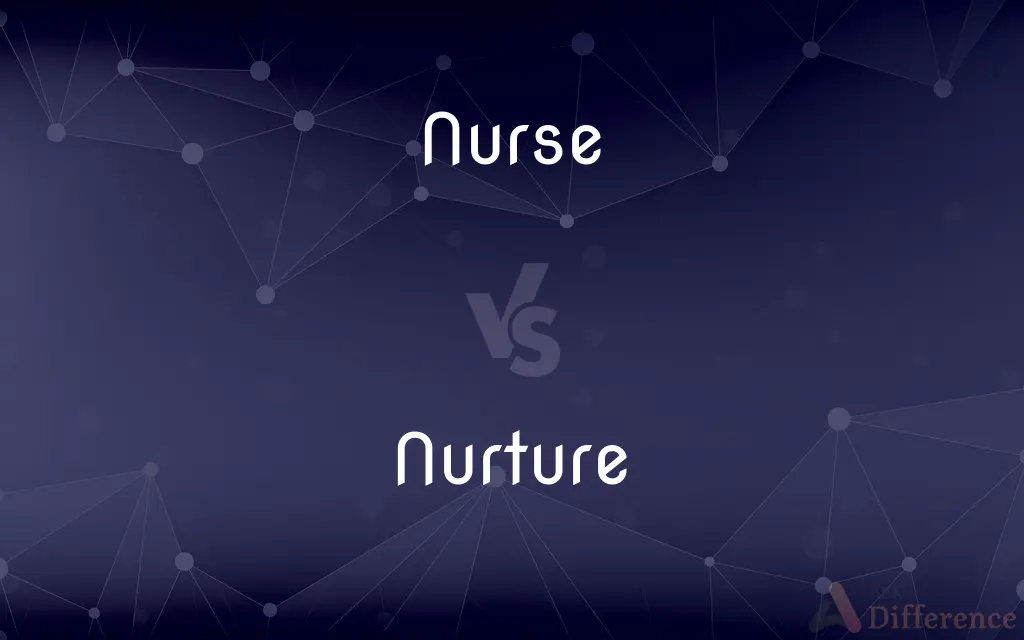Nurse vs. Nurture — What's the Difference?
By Tayyaba Rehman & Fiza Rafique — Updated on March 19, 2024
A nurse provides medical care and support, focusing on health and recovery, whereas nurture involves caring and encouraging growth or development in a broader sense.

Difference Between Nurse and Nurture
Table of Contents
ADVERTISEMENT
Key Differences
Nurses are professionals in the healthcare sector, trained to offer medical assistance, care, and support to patients in various settings. They work under the guidance of physicians and can specialize in areas such as pediatrics, emergency care, and surgery. On the other hand, nurture refers to the process of caring for and encouraging the growth or development of someone or something. This concept is often discussed in the context of child development, education, and psychology, emphasizing the environmental factors and support that contribute to an individual's growth.
While nurses directly impact physical health through clinical skills and patient education, nurturing impacts an individual's emotional, social, and intellectual development. Nurses implement care plans and medical treatments to aid recovery, whereas nurturing involves providing emotional support, education, and encouragement to help someone thrive.
Nursing is a licensed profession requiring formal education and training, including obtaining a degree and passing a licensing exam. Meanwhile, nurturing is a universal practice that anyone can provide, not limited by professional qualifications. It's an inherent part of parenting, teaching, and various supportive roles in communities and organizations.
Nurses follow evidence-based practices and medical protocols to ensure patient safety and effective care. In contrast, nurturing strategies can be more flexible and personalized, tailored to the specific needs and circumstances of the individual being supported.
Despite their differences, both nursing and nurturing share the common goal of fostering well-being and development. Nurses may also engage in nurturing behaviors as part of their care, emphasizing the holistic approach to health that includes emotional and social support.
ADVERTISEMENT
Comparison Chart
Definition
A healthcare professional providing medical care and support.
The act of caring for and encouraging growth or development.
Primary Focus
Health and recovery
Emotional, social, and intellectual growth
Required Qualifications
Formal education, training, and licensing
No formal qualifications required
Context
Healthcare settings
Varied contexts, including home and educational environments
Methods
Evidence-based practices and medical protocols
Flexible and personalized strategies
Compare with Definitions
Nurse
To tend carefully so as to promote growth or development.
He nursed the saplings through the harsh winter.
Nurture
To feed and protect.
The farmer nurtured the crops with great dedication.
Nurse
A person employed to take care of a young child or children.
The baby's nurse gently rocked him to sleep.
Nurture
Rearing, upbringing, training, and education.
His nurture was instrumental in developing his talents.
Nurse
A person trained to care for the sick or infirm, especially in a hospital.
The nurse checked the patient's vital signs.
Nurture
To bring up; to raise.
They nurtured the young birds until they could fly on their own.
Nurse
To feed and care for (a young child or animal).
The mother nursed her newborn.
Nurture
The process of caring for and encouraging the growth or development of someone or something.
Her parents provided nurture and support throughout her childhood.
Nurse
To give medical and other attention to a sick person.
She nursed her husband through his illness.
Nurture
To support and encourage, as during the period of training or development.
Teachers nurture students' abilities and interests.
Nurse
A person trained to provide medical care for the sick or disabled, especially one who is licensed and works in a hospital or physician's office.
Nurture
The action of raising or caring for offspring
The nurture of an infant.
Nurse
A person employed to take care of a young child.
Nurture
(Biology) The sum of environmental influences and conditions acting on an organism, especially in contrast to heredity.
Nurse
A woman employed to suckle children other than her own; a wet nurse.
Nurture
The fostering or overseeing of the development of something
The nurture of an idea.
Nurse
One that serves as a nurturing or fostering influence or means
"Town life is the nurse of civilization" (C.L.R. James).
Nurture
Something that nourishes; sustenance
"The butterfly poked its tiny proboscis down into her hair, probing for nurture" (Barbara Kingsolver).
Nurse
(Zoology) A worker ant or bee that feeds and cares for the colony's young.
Nurture
To raise or educate (a child, for example).
Nurse
To serve as a nurse for
Nursed the patient back to health.
Nurture
To encourage or help develop; cultivate
"a small college town that had nurtured his intellectual and creative pursuits" (James S. Hirsch).
Nurse
To try to cure by special care or treatment
Nurse a cough with various remedies.
Nurture
To provide sustenance for; nourish
The meadow that nurtures the cattle.
Nurse
To treat carefully, especially in order to prevent pain
He nursed his injured knee by shifting his weight to the other leg.
Nurture
The act of nourishing or nursing; tender care
Nurse
To manage or guide carefully; look after with care; foster
Nursed her business through the depression.
Nurture
That which nourishes; food; diet.
Nurse
To bear privately in the mind
Nursing a grudge.
Nurture
The environmental influences that contribute to the development of an individual (as opposed to "nature").
Nurse
To consume slowly, especially in order to conserve
Nursed one drink all evening.
Nurture
To nourish or nurse.
Nurse
To serve as a nurse.
Nurture
To encourage, especially the growth or development of something.
Nurse
(archaic) A wet nurse.
Nurture
The act of nourishing or nursing; tender care; education; training.
A man neither by nature nor by nurture wise.
Nurse
A person (usually a woman) who takes care of other people’s young.
They hired a nurse to care for their young boy.
Nurture
That which nourishes; food; diet.
Nurse
A person trained to provide care for the sick.
The nurse made her rounds through the hospital ward.
Nurture
To feed; to nourish.
Nurse
(figurative) One who, or that which, brings up, rears, causes to grow, trains, or fosters.
Eton College has been called "the chief nurse of England's statesmen".
Nurture
To educate; to bring or train up.
He was nurtured where he had been born.
Nurse
(horticulture) A shrub or tree that protects a young plant.
Nurture
The properties acquired as a consequence of the way you were treated as a child
Nurse
(nautical) A lieutenant or first officer who takes command when the captain is unfit for his place.
Nurture
Raising someone to be an accepted member of the community;
They debated whether nature or nurture was more important
Nurse
A nurse shark or dogfish.
Nurture
Help develop, help grow;
Nurture his talents
Nurse
(transitive) To care for (someone), especially in sickness; to tend to.
She nursed him back to health.
Nurture
Bring up;
Raise a family
Bring up children
Nurse
(transitive) To treat kindly and with extra care.
She nursed the rosebush and that season it bloomed.
Nurture
Provide with nourishment;
We sustained ourselves on bread and water
This kind of food is not nourishing for young children
Nurse
(transitive) To manage with care and economy.
Nurse
(transitive) To drink slowly, to make it last.
Rob was nursing a small beer.
Nurse
(transitive) To foster, to nourish.
Nurse
To hold closely to one's chest
Would you like to nurse the puppy?
Nurse
To strike (billiard balls) gently, so as to keep them in good position during a series of shots.
Nurse
One who nourishes; a person who supplies food, tends, or brings up; as: (a) A woman who has the care of young children; especially, one who suckles an infant not her own. (b) A person, especially a woman, who has the care of the sick or infirm.
Nurse
One who, or that which, brings up, rears, causes to grow, trains, fosters, or the like.
The nurse of manly sentiment and heroic enterprise.
Nurse
A lieutenant or first officer, who is the real commander when the captain is unfit for his place.
Nurse
To nourish; to cherish; to foster
Sons wont to nurse their parents in old age.
Him in Egerian groves Aricia bore,And nursed his youth along the marshy shore.
Nurse
To bring up; to raise, by care, from a weak or invalid condition; to foster; to cherish; - applied to plants, animals, and to any object that needs, or thrives by, attention.
By what hands [has vice] been nursed into so uncontrolled a dominion?
Nurse
To manage with care and economy, with a view to increase; as, to nurse our national resources.
Nurse
To caress; to fondle, as a nurse does.
Nurse
One skilled in caring for young children or the sick (usually under the supervision of a physician)
Nurse
A woman who is the custodian of children
Nurse
Try to cure by special care of treatment, of an illness or injury;
He nursed his cold with Chinese herbs
Nurse
Maintain (a theory, thoughts, or feelings);
Bear a grudge
Entertain interesting notions
Harbor a resentment
Nurse
Serve as a nurse; care for sick or handicapped people
Nurse
Treat carefully;
He nursed his injured back by liyng in bed several hours every afternoon
He nursed the flowers in his garden and fertilized them regularly
Nurse
Give suck to;
The wetnurse suckled the infant
You cannot nurse your baby in public in some places
Common Curiosities
What is the main role of a nurse?
Nurses are healthcare professionals focused on patient care, medical assistance, and support, promoting health and recovery.
Is nurturing limited to child development?
While often associated with child development, nurturing also applies to caring for anyone or anything, encouraging growth and development.
What makes nurturing effective?
Effective nurturing is characterized by empathy, patience, and personalized support tailored to the individual's needs.
How does nurture impact development?
Nurture significantly impacts an individual's emotional, social, and intellectual development by providing care, support, and encouragement.
Can anyone perform nurturing actions?
Yes, nurturing actions can be performed by anyone, not just professionals, as they involve caring for and encouraging growth.
Can nurturing have a long-term impact?
Yes, nurturing can have a profound long-term impact on an individual's well-being, development, and success in life.
Is formal education required to provide nurture?
No, providing nurture does not require formal education; it's a practice based on care, support, and encouragement.
Do nurses need specific qualifications?
Yes, nurses require formal education, training, and licensing to practice professionally in healthcare settings.
How do nurses and nurturing roles intersect?
Nurses often engage in nurturing behaviors as part of their holistic approach to care, supporting patients' emotional and social needs alongside their physical health.
Are there different types of nurses?
Yes, there are many types of nurses, including registered nurses, nurse practitioners, and specialized nurses, each with different roles and responsibilities.
What challenges do nurses face in their profession?
Nurses face challenges such as long hours, emotional and physical strain, and the need to keep up with medical advancements.
What skills are essential for nurturing?
Essential skills for nurturing include empathy, communication, patience, and the ability to provide support and encouragement.
Can nurturing influence personality development?
Yes, nurturing can significantly influence personality development by shaping an individual's emotional and social skills.
How can nurturing be incorporated into everyday life?
Nurturing can be incorporated into everyday life through acts of kindness, support, encouragement, and taking time to care for others' growth and well-being.
How do nurses contribute to a patient's recovery?
Nurses contribute to a patient's recovery by providing medical care, monitoring health, and offering support and education on health management.
Share Your Discovery

Previous Comparison
Sag vs. Sink
Next Comparison
Enlist vs. ConscriptAuthor Spotlight
Written by
Tayyaba RehmanTayyaba Rehman is a distinguished writer, currently serving as a primary contributor to askdifference.com. As a researcher in semantics and etymology, Tayyaba's passion for the complexity of languages and their distinctions has found a perfect home on the platform. Tayyaba delves into the intricacies of language, distinguishing between commonly confused words and phrases, thereby providing clarity for readers worldwide.
Co-written by
Fiza RafiqueFiza Rafique is a skilled content writer at AskDifference.com, where she meticulously refines and enhances written pieces. Drawing from her vast editorial expertise, Fiza ensures clarity, accuracy, and precision in every article. Passionate about language, she continually seeks to elevate the quality of content for readers worldwide.














































